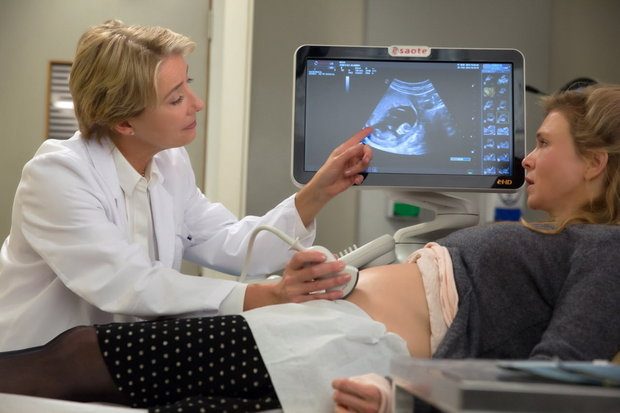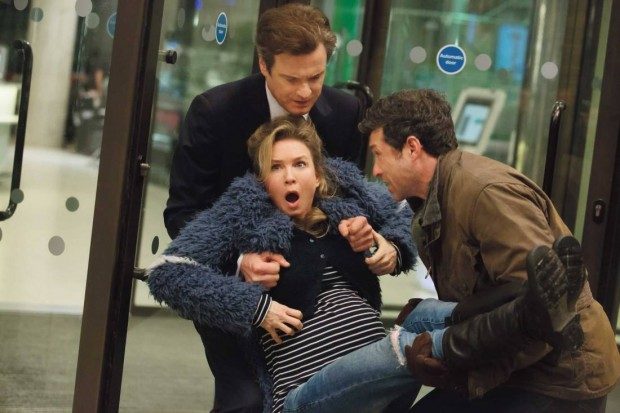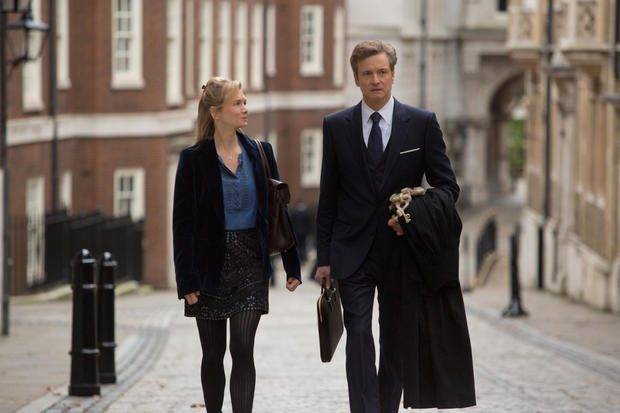

The opening scene of Bridget Jones’s Baby, the third feature film centered around the English singleton played again (for the third time) by Renée Zellweger, calls back the intro for the franchise’s first chapter, Bridget Jones’s Diary (2001). Alone in her pajamas, glass of wine in hand in her London flat, Jones sways and sings along to the sad-sack standard “All By Myself.” While her younger self was more prone to self-pity and a lack of self-control, here she’s seemingly more confident in her own body – she quickly changes tunes to the more upbeat “Jump Around” and starts jumping on her bed, for instance. But still, she remains essentially the same complexly drawn, specifically shaped, romantically challenged woman which made her fictional 90s feminist icon along with likes of Carrie Bradshaw and Ally McBeal. Of which all are testaments to the mostly graceful (we should all just forget about Bridget Jones: The Edge of Reason, the silly, nonsensical second entry) and intuitive book-to-screen adaptation of Helen Fielding’s keenly shaped character.
Much of the credit belongs to Zellweger herself. It may be difficult to fathom now considering Bridget Jones is her signature role, but before Bridget Jones’s Diary opened to stellar reviews, large box office numbers and a surprising but worthy Oscar nod for its leading lady, Zellweger’s casting was considered near heresy to some. After all, she’s Texan and petite and her biggest claim to fame prior to this came in playing Tom Cruise’s girlfriend in Jerry Maguire. How on Earth could she authentically articulate a character prone to weight fluctuation, awkward romantic and sexual entanglements and the messy, singularly British, messiness of thirtysomething womanhood? Well, acting chops help plus Zellweger’s uncommon gift in genuinely summoning a built-in rooting factor with her audience. In Bridget Jones, Zellweger shines a thoughtful, yet carefully shaded vulnerability which seep through even during Bridget’s most painfully embarrassing moments. Even at her worst or when her vices get the better of her, there’s a lovely yet fully realized sense of a woman trying to figure life out in the moment in Zellweger’s hands.
Thankfully, that thoughtfulness is alive an well in Bridget Jones’s Baby, a pleasant if meandering third (and likely final) screen chapter. Bridget, now in her forties, is a bit more weathered, but seemingly more sure of herself. Her romantic life is still a mess with Mr. Darcy (Colin Firth, returning for his second signature “Mr. Darcy” role) now married to another and Daniel Cleaver missing altogether – fans of the Hugh Grant cad needn’t worry, his absence doesn’t go unnoticed. Yet, she’s a sharp and successfully driven television news producer, she quit smoking and while her friends are now married with children, a bit more sure-footed than before, despite a bad birthday for the ages that in her younger days would have caused supreme emotional upheaval. That is until she unexpectedly, as the film’s title makes clear, becomes pregnant. But wait, who’s the daddy?
Well, there’s two options: billionaire playboy Jack (Patrick Dempsey) whom Bridget hooked up with at a music festival and Mr. Darcy of all people, after he and Bridget become moony following the christening of a mutual friend’s child – the decades old, environmentally friendly condoms that Bridget prefers didn’t help, one of the sharper jokes in the screenplay credited to Dan Mazer (I Give It a Year), Emma Thompson (who appears in the film as Bridget’s obstetrician) and Fielding herself. While the plot chugs along at a predictable click – detours abound with Bridget’s indecision on how, when or even if to tell her baby daddies the truth – Zellweger and returning director Sharon Maguire (she directed the first film but bowed out for the second) mark Bridget Jones’s Baby with a swift and harmless professionalism so that even the stalls and grinds in narrative or comic momentum never steer the ship too off course.
Then again, none of the Bridget Jones stories have been driven by particularly innovative plot dynamics. While the character of Bridget herself is an involving, realistically drawn Everywoman, the stories that bind come pretty squarely in the wish-fulfillment variety, just soaked in Gen-X irony. So while Jack, a likable online dating entrepreneur, somewhat throws a wrench into the proceedings as he attempts to prove his worth to Bridget, his character is clearly never meant to provide an actual alternative for Bridget herself, despite what a paternity test may read. For his part, Dempsey is a good sport and performs his gratuitous shirtless scenes with smile on his face. However, the history between Bridget and Mr. Darcy has always been the Bridget Jones focal point and the movies have been smart enough to realize that in foregrounding the awkward, but endearing chemistry between Zellweger and Firth. Bridget’s unpolished grace and Mr. Darcy’s dapper, if tightly-wound, sophistication is a staple of romantic tropes that’s been around for centuries – for sure, there’s a formula here, but that doesn’t mean it doesn’t work.
So, while Bridget Jones is probably pretty square now, and sure, perhaps a third film entry for the hapless romantic may not have been particularly necessary, a charm and easily digestible sense of nostalgia keeps the movie afloat. A grating subplot where Bridget is threatened at work by feckless millennials (those beards!) aside, Bridget Jones’s Baby is an often quite witty – choice line of dialogue on the phenom of “glamping” (glamour camping): “calling him Gladolf Hitler wouldn’t suddenly make us forget all the unpleasantness” – and offers a fond reunion of sorts with Zellweger, a gifted light comedienne whose appearance, unfortunately, has distracted us from her effortless screen presence and precise comic timing. Zellweger still has a genuine rooting factor ever in her favor.
Verdict: ★ ★ ★ ☆ ☆
Without perjorative claim-making, Bridget Jones’s Baby is a lovely airplane movie. Easy, breezy and light on its feet – even if it’s about thirty minutes too long – the film easily passes the low bar set by the logic-impaired second Bridget Jones outing, released twelve years ago. While it doesn’t quite make as fetching an outing as the first film, Renée Zellweger acquits herself naturally and charmingly in her signature role.



